12.05.16
Posted in Europe, Patents, Rumour at 6:57 pm by Dr. Roy Schestowitz
Early Certainty from ILO (serving Battistelli the news)

Summary: Months after we learned that a former staff representative in Berlin had been dismissed we come across an anonymous claim that Berlin’s ‘branch’ of the EPO will be folded onto Munich’s
EARLIER THIS year, at around the beginning of September, we repeatedly wrote about claims that Battistelli’s union-busting actions (with bogus accusations and fake trials) had struck Berlin, not just Munich (and thereafter The Hague). It ought to be pretty clear by now, based on the ruling from judges as well, that ‘justice’ does not exist at the EPO; it’s about as legitimate as Turkish courts in 2016 (after a lot of perfectly-legitimate judges were toppled). We’ve carefully read again all the articles about the latest two ILO-AT decisions (it probably takes a lawyer otherwise, in order to understand the ramification for other cases) and we have just noticed that WIPR wrote an article about this almost a week later, following The Register, IP Watch, and Techrights (which was first to report on this).
To quote the article’s first few paragraphs:
The Administrative Tribunal of the International Labour Organization, a UN agency, has set aside two decisions made by the European Patent Office (EPO) and criticised the Administrative Council in the process.
On Wednesday, November 30, the tribunal dismissed the rulings, which had rejected employee challenges to internal rules.
The first decision, judgment number 3785, stemmed from a practice and procedure notice, which concerned the documents that make up European patent applications, issued by the EPO in 2013.
Now that Battistelli shuffles people around in alleged attempts to retaliate (collective punishment), e.g. moving the boards to Vienna, then Haar (not absolutely confirmed yet, except the budget), one should recall what we wrote about Berlin on the first of September, in light of this rumour which says “heard from the Isar building last week that this is exactly what Battistelli has in mind once the “haar-cut” is done: Berlin should be (des)integrated into Munich.”
 Can someone confirm? On the right by the way is a photo of EPO staff in Berlin protesting in support of the dismissed staff representatives from Munich, urging Maas to offer support (he never did).
Can someone confirm? On the right by the way is a photo of EPO staff in Berlin protesting in support of the dismissed staff representatives from Munich, urging Maas to offer support (he never did).
“Officially (usual lullabies) this is to increase efficiency (in reality this is to retaliate on the Berlin sub-office which has refused to submit since the beginning),” the same comment continues.
As we noted here several times before, such relocations can discourage people from staying in their job; some of them have spouses and kids in some job and/or school/kindergarten, respectively. It would be a convenient way to get rid of highly-paid staff without announcing any layoffs. See what happened in the now-understaffed boards. █
Permalink
 Send this to a friend
Send this to a friend
Posted in Deception, Europe, Patents at 7:55 am by Dr. Roy Schestowitz
‘Damage control’ from the most damaging (to the EPO) President ever!
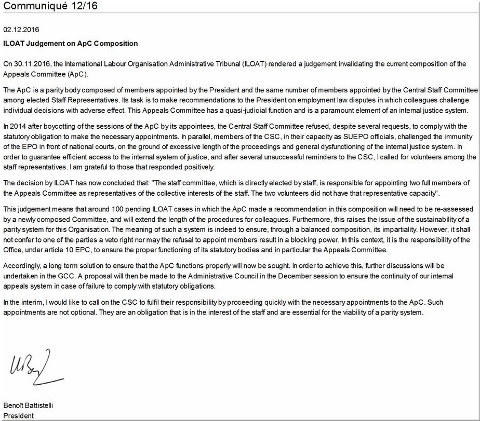
Click for large version
Summary: A look at Battistelli’s response to the latest from the International Labour Organisation (ILO), exceptionally delivering two decisions at the very end of last month
THE ILOAT recently slammed (albeit politely) the Internal Appeals Committee of the EPO. It has been a sham for a long time, the Tribunal found. This means there was no Rule of Law or justice (no functional access to real justice) at the EPO under Battistelli. Presidential decrees and legal harassment/bullying by the President turned the Office into a laughing stock all across Europe and even the world.
As expected, late on a Friday (the usual) Battistelli responded with more of the usual lies and hogwash. The EPO is experiencing a post-truth era, so why not again? The response can be seen at the top. But it’s all wrong.
Note that in July of this year the EPO, in Judgment No. 3694, was already reminded of the importance of a properly-formed Internal Appeals Committee. The present formation of the Appeals Committee, with the two “volunteer” Staff Representatives, was preceded by a short period where there were no Staff Representatives on the Committee at all. In Judgment No. 3694 [PDF] the ILOAT sent a case complaining about that arrangement back to the EPO “so that the Appeals Committee, composed in accordance with the applicable rules, may examine the appeal.”
Here is some background from the CSC side — a publication from 2014 (four pages).
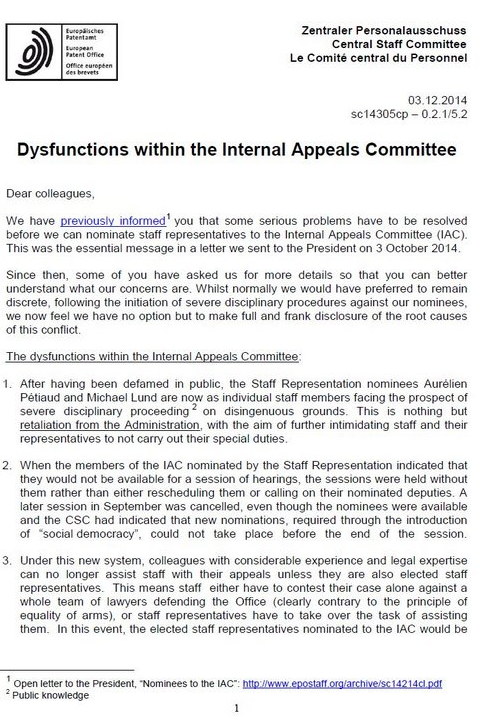
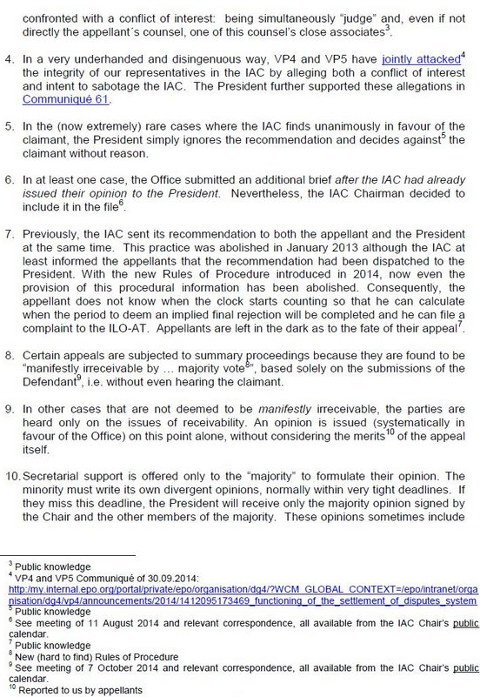
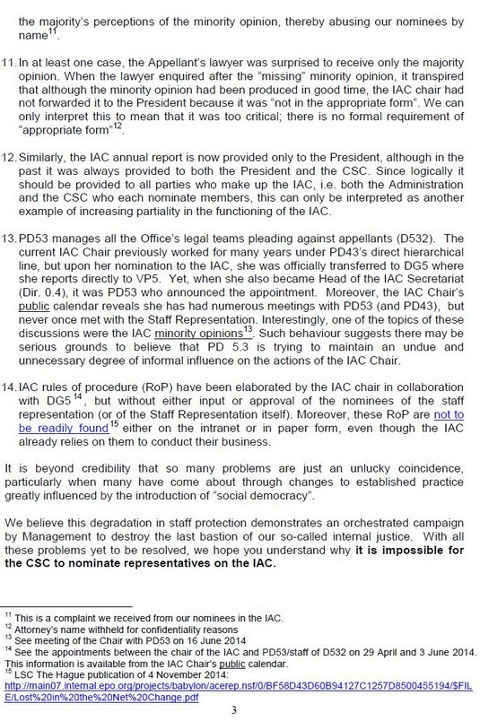
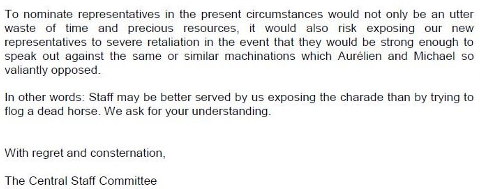
It’s not too hard to see why the EPO feels as though needs to lie again. It got caught in a scandal — one in which cyclical lies are essential (like the Watergate Scandal). When asked for its response by IP Watch, which wrote an article on the subject, “The European Patent Office has emailed some gobbledygook in response to the article of IP-Watch,” as one person put it.
Earlier today we wrote about the quarrels Battistelli has with French politicians and the latest comments in The Register further reinforce the observation that Battistelli tarnishes the image of France. One person even called it “typical French behaviour” and alleged something to that effect; “I would say Battistelli is a typical Frenchman,” the comment says, “arrogant, does not listen to critique, believes he is superior to the rest of the world. France in a nutshell.”
A new comment in IP Kat says, “according to my info Battistelli also left the office of the German Minister Heiko Mass, with a “connard” (loud enough to be heard by the Minister Maas who speaks FR) – he also clashed with the NL state secretary, with the head of USIPO and JPIPO. to be continued…. Hey bro’ who’s the boss in da EPO ?”
“Let’s hope the AC delegates act before it is too late.”
–AnonymousA tongue-in-cheek comment said: “Currently being rolled out in the EPO is a PRISMA information security policy, it is not about information theft prevention but information manipulation on a scale never seen before! … BB’s chiefs, HR and the IU are taking key positions and use information control tactics to gain ultimate control over Eponia and any opposition. Let’s hope the AC delegates act before it is too late.”
Look what has become of what used to be the pride of Europe. Time for Battistelli to resign rather than continue his charade of lying and finger-pointing. █
Permalink
 Send this to a friend
Send this to a friend
Posted in Europe, HP, Patents at 6:58 am by Dr. Roy Schestowitz

Summary: “Good for trolls” is a good way to sum up the Unitary Patent, which would give litigators plenty of business (defendants and plaintiffs, plus commissions on high claims of damages) if it ever became a reality
TODAY marks exactly one week since the bizarre statement from the British government, which enjoyed misleading coverage bought/paid for directly and less directly by Battistelli’s EPO.
In the previous four parts we explained the reality of the situation and in upcoming parts we’ll explain why the UPC is still going nowhere — consistent with what we have been saying for a number of years. Some words on a Web page of the British government are not enough to make the impossible (or barely possible) magically attainable.
It’s worth reminding readers that the legal firm which the EPO unleashed at us for legal threats (in an effort to silence us) is itself part of the UPC's advocacy, which comes to show just how crooked things really are. Basically, a bunch of law firms are attempting to hijack the European patent system by means of endless lobbying, lies, fake (or biased) 'news', and fake job ads (for jobs that don't exist). These are some truly malicious actors. Morals don’t exist because they have a mission and they are willing to combat opponents. Our activism is largely reactionary.
Who is the UPC good for other than some legal firms? “Good news for patent trolls,” said this comment, possibly from Mr. Benjamin Henrion (FFII) by the sound of it.
Several days ago Patently-O wrote about last week’s news, noting that “Europe may overtake the US as patent-litigation-central” if the UPC becomes a reality. Another way to put it is, Europe can become a patent trolls’ hub, complete with software patents and everything they currently enjoy in the US (where they file the lion’s share of lawsuits). The Unitary Patent fantasists include those who can either represent these trolls in court or represent their victims (defendants). What’s not to like, eh?
Earlier today we noted that Microsoft agenda was interjected into an event that’s supposed to be about “International Women’s Leadership Forum” (here is the report about it). Well, Microsoft and even the UPC were interjected into this event. The latter subject was mentioned by “Deanna Kwong of Hewlett Packard Enterprise,” who said that the UPC “will be “fertile ground” for NPEs,” i.e. patent trolls (NPE is a euphemism).
Even MIP took note of it, writing in Twitter: “Consensus at #EUPatentUSA2016 that UPC system will attract troll-type activity – IT/TMT panel with @marksandclerk pic.twitter.com/2cbvgnBeSl”
Henrion replied with “oh really? what a surprise!”
We have been warning about this for years.
Here is the relevant part of the report from MIP:
The last six months (since the UK Brexit vote) have led to great uncertainty for Europe’s planned Unitary Patent and UPC system, said Bethan Hopewell of Powell Gilbert. But much progress has been made with 11 ratifications so far and much work on the IT system, the Rules of Procedure and the financing.
The latest news, she added, is yesterday’s announcement by the UK government that it will proceed with ratification of the UPC Agreement. “What needs to be worked on now is establishing certainty for industry so that the UPC is not undermined when the UK leaves the EU,” she said, adding that the UK’s role in the system post-Brexit remains to be seen.
Deanna Kwong of Hewlett Packard Enterprise said that despite the progress made there remains a lot of “uncertainty”: “I don’t know whether it will be a more favourable forum or not … at the outset it may be a more plaintiff-friendly forum to legitimate it as a forum.” Hopewell predicted it will be “fertile ground” for NPEs in the early years.
Kwong highlighted some differences between the UPC and the US system, including less emphasis on expert evidence, faster injunctions and the possibility to amend claims. “Fee shifting is a really big factor – hopefully that will be a counter-balance to the patentee-friendly aspects of the UPC,” she added.
It seems like both Henrion and I noticed this at the same time. HP is admitting that the UPC would be good for patent trolls. Remember all those who used to deny it and mocked those who even dared to suggest so?
“HP says EU Unitary Patent Court will fuel trolls,” Henrion later wrote.
“This is what patent prosecution & litigation in Europe will look like post-UPC,” MIP added, “says Bethan Hopewell of Powell Gilbert at #ipwomen Forum pic.twitter.com/NXxNaFgAuu”
Yes, “prosecution & litigation”…
Not innovation.
Not sharing.
Not competitiveness.
Remember… “prosecution & litigation”…
That’s all it boils down to and no wonder prosecutors and litigators are lobbying so hard for it. They want ‘nuclear’ legal wars to profit from. It’s obvious at whose expense. █
Permalink
 Send this to a friend
Send this to a friend
Posted in Europe, Patents at 3:32 am by Dr. Roy Schestowitz
No career fallback with Nicolas Sarkozy, either

Summary: The latest messages about Battistelli’s regime at the EPO, which faces growing opposition from more directions than ever before
THE EPO seems to be reaching another tipping point, where not only ILO and politicians take the side of EPO staff but a lot of the British media too (definitely not the German media, which seems to enjoy the EPO as a local cash cow). Even a British mouthpiece of the EPO gave a platform to an EPO staff representative a couple of weeks ago. To quote this recent comment, “Mr Prunier’s post on IAM blog : http://www.iam-media.com/blog/Detail.aspx?g=2141acfb-0254-48ab-a380-31fee0da7f97″
Another new comment says that a “reply from the [French] secretary for industry reveals he has even contacted BB to express his discontent.”
The “President of the EPO simply insults the Minister for Industry (responsible for patents in France),” wrote the following comment in reply. Certainly not a way to make friends and allies:
Phillips Cordery was present at the latest demonstration in The Hague. He gave some details in his speech. Christophe Sirugue (Minister for Industry) indeed talked to Battistelli about the social situation. Battistelli answered that he did not care about his opinion.
I could not believe my hears in that demo: there was a MP, talking in public, and announcing that the President of the EPO simply insults the Minister for Industry (responsible for patents in France). But ask anyone present and they will tell you.
What is even more worrying is that Battistelli is probably right. He IS indeed more powerful than a French Minister (or a German, English, Swiss… etc). He has immunity and nobody can do a thing against him.
Phillips Cordery (mentioned above) is the latest among several French politicians who call Battistelli an embarrassment/humiliation/"disgrace"/"damaging to the image of France".
“Tragedy hangs in the air,” said another comment, as “further dismissals ring out.” Well, Battistelli and Bergot have more in the pipeline, but can the Administrative Council or outside intervention put an end to it? Here is the full comment:
It is chilly in the EPO. It is the chill of a fanaticism that has enveloped itself in a harness of principles. Tragedy hangs in the air, further dismissals ring out. A political statement, the scandal of which reverberated far into Europe. BB’s response sounds hollow and hypocritical, ‘No one can escape his duty!’
“Even examiner team managers are showing opposition to the regime” of Battistelli, said the following comment, reinforcing what we heard before (even some Directors join the protests). Here is the comment in its full glory:
Very chilly indeed. Even examiner team managers are showing opposition to the regime: they ignore duties when it comes to completing their examining/oppo duties within the official timescales. The ILO is now pointing at total meltdown. Europe and its innovators deserve much better than this clapped out Enarquien despot. Clean sweep, please.
Perhaps optimistic about the morals of a chinchillas killer, one person believes that the Administrative Council, well paid (or strategically gifted) by Battistelli, will dismiss him:
Why the AC will not dismiss BB?
Because the AC is deeply divided. The AC members from the south – south of France, that is – and from the East – east of Germany, that is – do not care about the internal reputation of BB. Authority and hierarchy are good. And for each and every decision that is even a little bit out of their mandate, they have to Phone home.
At least one of the AC members from some other countries – a rather small country, one of the founders – is rumoured to be very vocal against BB.
But with a divided AC, BB – at the ENA well prepared for politics – will win. The earliest moment BB will leave is with an UMP president in France, probably provided he currently support that candidate (oops, missed the debate tonight…)
The AC wanted someone to put the examiners back to work, work a little harder and pick up files within one to two years after the last letter from the patent attorney – rather than sometimes over six years. The AC made a pact with the devil. The rest is history…
“It’s the end of the EPO as we know it,” another person wrote, “but I feel fine, I’ve got my design.”
Going further back in the comments (over a fortnight backwards), there are many comments which we deem “trolling” or intentionally provocative. We don’t want to draw attention to these as that would only encourage them. Here is one among many responses to such comments:
@ Dry Tears
Why is it that the board members get critisised when they haven’t done anything wrong, unlike the senior management and the Admin Counc who escape your censure. Whose side are you on?
@ the anonymous “Anonymous”
Have you read Merpel’s blog entry? Who is to blame for this mess? The board member you want to see dismissed? Shall we now start dismisssing judges who don’t conform? Why don’t you have a go at getting disciplinary proceedings going against the alleged “enemies of the people” in the UK? Yes, that is the sorry road we all seem to be going down, whether we want to or not.
“Battistelli and his minions have seemingly being drip-feeding information to the press,” noted another person on defaming of the accused board member. Here is the full comment which is actually quite informative:
Also worth reiterating is the fact that, while the suspended Board member is forced to remain incommunicado in the public sphere, BB and his minions have seemingly being drip-feeding information to the press (a) enabling the member in question to be identified without too much difficulty; and (b) containing tantalising hints of the allegations against him, making a mockery of the judicial process.
Namely: without having to look too deeply, it’s possible to find in various sources information about which Board the suspended BOA member comes from; what his nationality is; what his specialism is; and asserting variously that he’s been accused of carrying dangerous weapons within the office, spreading Nazi propaganda, disseminating defamatory information against a certain Croatian Vice-President of the Office, collaborating somehow (in ways curiously unspecified) with at least one of the suspended or fired staff representatives, and so on and so forth.
Some or all of this may be true. We simply don’t know (though I certainly find it doubtful, not least given the public prosecutor’s finding that the allegedly-defamatory press articles were not defamatory). It is surely not right under any reasonable concept of “justice” that the Office is apparently free to cast around such hints and accusations in public while the accused Board member is effectively gagged.
We should also not forget that some of the alleged evidence against the accused was reportedly obtained by means of key logging software or other such spyware installed on computers in public areas of the Office, and that these covert surveillance measures were apparently only authorised retrospectively by the EPO’s data protection officer, after the actions had already been taken.
The seemingly unnecessary plan to move the Boards out of central Munich, too, could do with closer scrutiny. According to some reports I’ve seen elsewhere, this plan has now been backed but only because the majority of AC representatives *abstained* in the crucial vote, thus leading to a “majority” in favour of the plan which actually represents a minority of the delegates. This is outrageous. Abstention is a completely ineffective means of registering a protest if it doesn’t stop the plan going ahead!
“The President has carte blanche and is using it to defeat his only serious opposition – SUEPO,” according to this comment which also relates to the Unitary Patent — a subject we’ll revisit shortly.
No, Anon, a single country cannot interfere, but what about the EU acting as a bloc? It would theoretically be possible for it to command a decisive majority. Indeed it would be very much in its interest in view of the importance to it of the Unitary Patent.
Is this going to happen? Of course not.
Any more than the prescribed ministerial conference is going to happen. When I mentioned the latter in my last post it was because I thought it might at least put some identifiable politicians in front of their responsibilities. But the fact that no-one is responsible for for carrying out this obligation means that it is just a purely theoretical possibility, meant to confer the mere appearance of democratic accountability on the doings of the EPO.
So there is no political entity, country or individual that can intervene. The President has carte blanche and is using it to defeat his only serious opposition – SUEPO.
The next few comments managed to avoid the trolls and stay on target/focus, i.e. the appeal boards. To quote one comment:
One point – an abstention must always be ineffective. It isn’t a vote against but a vote to let the rest decide for whatever reason. The risk is that when too many abstain, the resulting vote lacks authority and also you may then realise how you really felt. In this case if the vote had been against, I’m not sure you would be so agitated.
But I agree with the rest of your points.
A Bundesverfassungsgericht decision is then mentioned as follows:
There are many foul elements to this sorry story, in my view the most disgusting being the possibility for indefinite suspension of BoA members. As Merpel points out, the President no longer needs to go to the trouble of A.23(1) EPC (having spectacularly failed with this 3 times already…) – instead a troublesome BoA member can just be suspended until their tenure runs out. This is absolutely contrary to judicial independence and I look forward to reading the Bundesverfassungsgericht decision on this.
Bit of a risk involving the Bavarian police, no? I wonder if they had anything to say about key-logging / spy cameras, in contravention of German Datenschutzgesetz? Remarkable temerity to involve the police to ask them to act under national law while flouting that same law (sorry – being immune to it) as regards data protection. I don’t believe that such covert surveillance would anyway be admissible before a German court; it would itself be possibly deemed illegal surveillance.
Here is a good explanation of how or why Battistelli has managed to survive in his job so far:
Politicians in the countries, the governments, of Western Europe are fond of patting themselves on the back, when they berate the rest of the world for being unable to maintain The Rule of Law. OK, well then, the Administrative Council of the EPO is an ideal vehicle for them to demonstrate to the rest of the world what they mean by “the Rule of Law” and how it is to be maintained.
And what do we see? Totally supine attitudes. The AC has no backbone. BB is to be held to account by a lump of Plasticine.
No wonder that, these days, authoritarian and lawless regimes all round the world have nothing but scorn for our precious western European democracies. All talk and no action.
Those of us who read Merpel here should try to explain to the honorable profession of journalists what’s going on here, and how the AC story is a good way to demonstrate to the wider general public, in specially simple terms, a practical example of the erosion of our precious rights under a Rule of Law.
“Past tense,” noted another person in relation to the last sentence above is “At EPO the Rule of Law”
Present tense is “At EPO the Rule of Low” (how low can Battistelli stoop before he’s terminated by the Council?)
The whole Organisation is a rogue institution now, not just the Office. As long as the Council is cooperative in this whole charade, one might view it as passively complicit.
“So,” wrote the following commenter, “the EPO has blatantly failed to follow the rule of law.” This has been going on for years actually. Laws are being broken repeatedly, usually to help cover up previous violations of the law. It’s like a Watergate Scandal in slow(er) motion and Battistelli takes the role of Nixon.
So, the EPO has blatantly failed to follow the rule of law. The AC has blatantly failed in its most fundamental role of overseeing the actions of the Office. To add to that, there are numerous rumours circulating about precisely how it is that the President of the Office manages to retain the undying loyalty of certain representatives to the AC.
It is not hard to come to the conclusion that the Office has been entirely captured by a bunch of self-serving career civil servants who care not a jot for the reputation of the Office or the people that work there and merely seek to further their careers (and other self interests).
It seems that we cannot rely upon the current “political” class to “drain the swamp” at the EPO. There is simply too much complicity. My suggestion is that light will serve as the most effective disinfectant here. Does anyone have the number of a good investigative journalist (assuming that such people still exist)?
Here is part of a little debate about “multi-lateral bodies” such as WIPO and the EPO:
I agree with MaxDrei in respect of the general inadequacies of multi-lateral bodies. We just have to look at the impotence of the United Nations in matters far more devastating than this EPO saga.
So-called modern nations can’t combine to police/control despots around the world and many are suffering. Unilateral action by countries such as the US, UK, France are essential to protect people from the genocides and terrorists slaughters that regularly occur.
There is a lot of noise among the comments, with someone who goes by the name “BBRox” and is not alone in spreading pro-Battistelli talking points. “Check out the last comment,” someone told us about this thread at one time, “the use of the “we” shows that BBRox is at the EPO. The only question is who it is…”
Whoever it is, the person isn’t alone and a lot of the discussion got lost, focusing on imaginary staff perks rather than abuses against the staff. It’s a distraction and reversal, putting staff on the defensive. We are happy to see Merpel resuming/continuing to cover EPO (resuming after 4 months!) in spite of threats and sanctions from the EPO, but we are saddened to see some comments showing up with sheer (and likely intentional) inaccuracies in them, like claims that EPO staff is paid half a million Euros per year.
Here is an interesting long comment about the issues associated with such unnatural/multinational institutions that exist in a legal vacuum:
Amongst international organisations granted immunities, the EPO is unfortunately far from being alone in failing to respect basic principles of the rule of law. A 2010 essay by Matthew Parish (https://papers.ssrn.com/sol3/papers.cfm?abstract_id=1651784) had this to say about the matter:
“The only way international law applicable to international organizations is enforced is either by the international organizations themselves, or through political pressure of their members. Neither of these is satisfactory, for obvious reasons. Self-regulation cannot expect to be effective, as the rules will be interpreted and applied in a way convenient to the organization applying them. Political pressure is arbitrary: the force that is brought to bear, even if disguised in legal language, is likely to reflect national political interests rather than legal principle. There can be no law without impartial adjudication of its content and application. The inference we must therefore reluctantly draw is that international organizations are lawless creatures, despite their best pretences otherwise. For all their formalities, procedures, internal regulations, bulging legal departments and quasi-legal language in which they cloak their operations, their legal structure is a phantasm. When the rhetoric is stripped away, the legal framework within which international organizations are revealed to operate is entirely self-serving. Divested of the only mode of accountability that might conceivably be available to constrain them, their true form is revealed as an utterly undisciplined bureaucracy, inward looking, unrestrained, hydra-headed but directionless, self-consuming, and subject to perennial self-serving growth”.
I am sure that this description of effective lawlessness will sound pretty familiar to those currently serving under BB’s cosh.
Sadly, the only solution proposed by Mr Parish (the introduction of legal accountability measures for international organisations) is not likely to be effective in the current situation… at least not unless national judges start developing theories by which certain actions of international organisations can be subject to the jurisdiction of national courts. Based upon the “opinion” issued in the case pending before the Dutch courts, this does not look likely to happen any time soon.
So, I guess I am back to reiterating my previous request: does anyone have the number of a good investigative journalist?
Surely it would not be too difficult to find “hard” evidence of actions by EPO management (or failures of oversight by the AC) that would breach provisions of all national laws (including provisions of the European Convention on Human Rights)? The first instance judgement in the Netherlands and the situation of the “suspended” judge spring immediately to mind. Analysis of the voting patterns of each national representative to the AC could well provide a rich source of information too.
Watch the following noteworthy observation about what Battistelli is doing as he strives to have an “INNOCENT PERSON dismissed,” to quote the following comment:
Mmh … let me see if I get it right:
the Munich Public Prosecutor – a fairly independent instance, I would say – has dismissed the complaint.
Did the President inform the Administrative Council of this important development in May?
Or is he using the AC to have an INNOCENT PERSON dismissed?
If anybody, at least the suspended member shall inform the AC, his own appointing authority.
It’s now also pretty clear why the president doesn’t want any external review of the cases of the dismissed Staff Representatives …
And then this came, regarding “dissemination of press articles [which] could constitute defamation under German law.”
The Prosecutor reviewed and analyzed the articles and concluded that their content was not in fact defamatory under German law. The Prosecutor also expressed doubt that in any event the dissemination of press articles could constitute defamation under German law.
Well, well, well … we now discover that the original accusation was “redistribution of press articles” which the Office “considered” “defamatory” against a “member of the senior management team at the EPO”.
(Everybody knows who this “member of the senior management team at the EPO” is. But now we now also understand why the EPO decided to block access to Techrights from within the Office … everything fits together perfectly …)
Given the reaction of the President and the mess in which he has put the Office, these articles should contain explosive material! What a pity that we cannot read them …
… but wait: we can! In Germany, legal proceedings are not subject to the cloak of secrecy imposed in EPOnia. In Germany, everyone can make his/her own mind, and not only hear the management’s version of the facts.
Anyone to get a copy of the decision of the Munich Prosecutor and retrieve a these “dangerous” articles*?
Also, send a copy of the decision to the German press that so far seems to have blindly followed the words of El Presidentissimo?
Mr. Battistelli has made a big mistake here. By the time the Munich Prosecutor announced his decision, he expected the suspended member to be already out of the EPO since long time …
* Yeah, I know they most probably are already available at Techrights, but still …
This defamation against the judge started at almost the exact same time that the EPO started sending threatening legal letters to Techrights. Both strategies (hypocritical SLAPP over “defamation” while the EPO itself is defaming an innocent man) began just shortly after the EPO had signed the first FTI Consulting contract. One wonders if both strategies were at least partly FTI Consulting’s idea (manipulating the Dutch and German press outlets by interjecting attack pieces into them and silencing other press by legal threats).
The EPO sure operates like some kind of a Mafia these days.
Here is a reply to people who think about applying for a job at the EPO:
you are free to apply to this paradise since EPO is hiring.
A salary and good working conditions are not a compensation for violation of fundamental rights or unhealthly management methods, and union bashing, denial of justice, bolchevik trials etc.
“Anyone who can is leaving,” notes the following comments, “early retirements are skyrocketing” (we have heard of actual numbers that confirm this trend). To quote:
It really grieves me to say it after many happy years in the EPO as an examiner, but I can’t recommend that you pursue your application. It is wishful thinking to hope that the badness is all at the top, and the lower management and staff join together to ignore as much as they can what BB and co. are doing. Anyone who can is leaving: early retirements are skyrocketing. You can see from the information in this blog and in the comments that BB’s power is completely unfettered, and is called a “reign of terror” without exaggeration.
You would not receive adequate training. Production pressure is so high that examiners are no longer willing or able to help one another with the benefit of their experience, as was always the case in the past. During the probationary year your targets will be unrealistic, such that you will have to violate your conscience many times in order not to fail.
Anyone brave enough to stand up to BB, such as staff representatives, or even senior managers, can be eliminated without any recourse to law. In this climate it is a miracle that any solidarity survives. It does, but it is hanging on by its fingernails.
It is difficult to see how the situation might improve. Unless and until there are some hopeful signs I would steer well clear.
The quality of comments thereafter is low as discussions have generally descended/devolved into some kind of quarrel between provocateurs and people trying to correct them. We don’t want to feed these as they’re a waste of time. We are not blaming the moderator for failing to maintain quality of comments (censorship should never be the answer), but the signal/noise ratio was down at that point. There were still lots of good comments in there, but they were lost amid many of which are just jokes and slightly off topic remarks. Commenters, many of whom are concerned EPO insiders, were spending a lot of time responding to pro-Battistelli voices that provoke by painting EPO staff as spoiled and self-centric. Here is one such response:
@zbrox as to being wrong. It is not only wrong on the moral merit, what you are writing, but also on the facts. A SR resigned. Evidently he did not feel harassed, as he did NOT file a disciplinary complaint which he could have done. Someone else did for him.
We believe that Bergot did this, but without having the documents leaked to us we can only guess based on vague responses from Mr. Prunier (LP). Here is a response to misinformation about LP:
Your facts on the LP case are interesting. Please quote your (independent or documentary) source.
Your characterisation of Suepo as Trump and BB as Clinton is equally incredible. Not least since BB is part of the right-wing party in France. Suepo, by the way, have not linked any of the current issues to more money or rights, contrary to your statement.
Regarding EPO work pressure, one person noted that it’s “not hard to imagine how this could lead to production pressure and low quality results.” Yes, patent quality has certainly declined. Nobody has told us otherwise. Here is an example of this troll-feeding comment (“BBrox” is one among few trolls):
I find BBrox comments very enlightening. If newly appointed examiners are seriously expected to deliver 90 products in their first year, how much time will be left for the “extensive 2 year training” advertised on the EPO jobs homepage? It’s not hard to imagine how this could lead to production pressure and low quality results.
Based on employment surveys, the EPO no longer even attracts many job applications (at least not of desirable quality), which means that quality of examination will suffer. Things won’t improve until Battistelli and his “swamp” say goodbye and even after they are all gone the EPO may take several decades to rebuild and maybe even regain its reputation. █
Permalink
 Send this to a friend
Send this to a friend
Posted in America, Europe, Patents at 3:07 am by Dr. Roy Schestowitz
Summary: A look at some recent articles regarding patent quality in the US and in Europe, in particular because of growing trouble at today’s EPO, which marginalises the appeal boards
THE QUALITY of patents determines the likelihood of winning court battles, or the certainty of sustained validity of patents once scrutinised closely enough (e.g. subjected to evidence/witness testimony in a court). Good examination with comprehensive prior art searches is what applicants ought to pay for; patents that are granted in haste are possibly worthless. Sometimes they can be worse than nothing at all. In fact, going to court with such patents can prove very costly to the plaintiff, which sometimes gets forced to pay the legal fees of the defendant/s (we covered some examples like that earlier this year).
With Alice and Mayo in a couple of domains (among many) the USPTO shows some encouraging signs of improvement. According to this new blog post, increase in prices may soon follow, however not yet for the following reasons:
Under the terms of the America Invents Act (AIA) fee increases cannot come into effect until 45 days after they are approved. That led to speculation by some that the agency might find itself in a showdown with Congressional Republicans if it tried to rush through the changes before the President-elect takes power. But, according to a source at the PTO, any final rule implementing the increase in fees will not be published until after the inauguration thereby averting a possible confrontation.
At the EPO, by contrast, we expect fees to suffer a decrease due to lack of demand in the coming years. Quality of EPs has definitely declined (EPO insiders always say so) and price hikes would only discourage pursuit/filing of new applications. Some very prolific applicants have not overlooked the EPO scandals. Without quality control we expect not just the social climate to tarnish the reputation of the EPO; there are technical concerns too.
According to this new blog post from IP Kat, an anti-HIV therapy patent has been partly thrown away by the EPO. “The patent was opposed by Merck at the EPO,” says the author, “but maintained in an amended form. That decision is under appeal, and the central amendment has therefore been suspended. In the meantime, Shionogi made an unconditional application to amend the UK designation of the patent in accordance with the claims maintained at the EPO. It also made two conditional applications to the Patents Court to amend. There are parallel proceedings in Germany and the Netherlands which are ongoing.”
This may mean that some structures for ensuring quality (control of scope) at the EPO are not entirely dead, but for how long? Opposition has become more expensive and window for opposition narrowed. This is a Battistelli (current administration) policy.
IAM, which says that the EPO is doing great on patent quality (because IAM is an EPO mouthpiece), has a new article in its ‘magazine’ in which it compares patent quality in Europe to patent quality in the US (probably not so different anymore, especially if one compares new EPO patents to new USPTO patents because they move in opposite directions and head for collusion).
A few days ago we mentioned the "poisonous priority" decision from the EPO's Enlarged Board of Appeal. Now, imagine what would happen if Battistelli was already crushing the EPO’s appeal boards (he can’t because of the EPC, but he certainly tries to crush them in other ways).
Some patent lawyers wrote about this decision [1, 2] and the latter article noted the meaning of it: “The uncertainty related to situations where an inventor devises a particular invention, and then subsequently realizes that the particular invention may be extended to a broader scope that encompasses their first invention. Provided that a second patent application for the broader subject matter is filed within 12 months of a first patent application directed to the narrower invention, the second application may claim priority from the first application.”
There was also a little ode about this, posted in the form of a comment on an article at IP Kat the other day:
The jilted generation: One’s love is but only for the kittens’ kittens, and so on forward forever to the end of cat-dom – for the rest it is poison.
Hello, yea, hold a sec. Battistelli there’s someone on the phone for you. Oh, f**k sake, trying to write this: jam (is only for tomorrow), man.
We have the poison,
Who has the remedy?
Who has priority’s practical remedy?
We have OR claims,
Ooh, split priorities
Which have alternatives defined countably
May be generic,
We can view sensibly
To have discrete theoretical identities?
We have the poison,
We have the referral,
For the Enlarged Board’s pontifical remedy.
We have the poison?
Who has the remedy?
We have the pressure, the pressure,
No doubt the EPO needs these boards, it needs them to be independent, well staffed etc. but instead they are being crushed by Battistelli. Quality control isn’t on this man’s agenda because all he is pursuing is “production” (as measured by the number of patents). The technical discussion about this case (over 20 comments and counting) alludes to pertinent parts of the patent in question, so we won’t delve into it. However, let this be a reminder of the importance of guarding the appeal boards, especially in the face of a megalomaniac like Battistelli who defames judges in the media, much like Donald Trump does. █
Permalink
 Send this to a friend
Send this to a friend
Posted in GNU/Linux, Law, Microsoft, Patents at 2:47 am by Dr. Roy Schestowitz

Summary: Microsoft’s continued fascination with and participation in the effort to undermine Alice so as to make software patents, which the company uses to blackmail GNU/Linux vendors, widely acceptable and applicable again
OUR longest article yesterday focused on poor advice — either deliberately bad advice or simply influenced by the echo chamber — regarding software patents. The patent microcosm is in growing denial over US courts invalidating software patents granted by the USPTO using Alice, or even patents invalided by PTAB (in much larger numbers).
Some days ago we saw this report from the 2016 International Women’s Leadership Forum, courtesy of patent maximalists.
As can be expected, it was somewhat of an echo chamber not in the gender sense but in the agenda sense. Microsoft was there too and here is the relevant part:
The first practical step, said Julie Kane Akhter of Microsoft, is to learn from cases where the patent has been upheld, such as Enfish, Bascom and Planet Blue.
“In the Enfish patent, for example, they were actually improving the operation of the computer itself,” she stressed. Lessons from the Enfish decision included: the specification was really important; consider identifying the technical problem in the specification; and avoid being too high level in the claims.
She said Enfish provides several practical strategies for applicants: utilise the interview; talk about the technical improvement; and cite Enfish! Lessons from Bascom are: consider discussing prior solutions and their drawbacks; highlight lack of preemption; and keep drafting software applications! And tips from Planet Blue are: argue the examiner has determined the idea in the claims at too high a level; argue the claim is specific enough and improves the technology; and draft claims with realistic scope and technical effect.
For those who forgot or have not been paying attention, Enfish ended up as a pro-software patents caselaw and Microsoft pays David Kappos, former Director of the USPTO, to lobby along those lines. He keeps trying to eliminate Alice (a Supreme Court case) as caselaw. Various patent law firms too still lick their lips over software patents and try to undermine Alice, hoping to ‘rewrite’ it with lower-level cases such as Enfish or Bascom.
On November 30th Dennis Crouch wrote about Microsoft v Enfish (not the other way around), nothing that it “Turns Out the Claims Are Obvious”. This is a PTAB case:
After instituting review, the Patent Trial and Appeal Board found some of the patent claims invalid as anticipated/obvious. On appeal, PTAB factual findings are generally given deference but legal conclusions are reviewed without deference. After reviewing the claim construction and rejections, the Federal Circuit affirmed in a non-precedential decision.
It’s no secret that Microsoft’s software patents are rubbish; their low quality was the subject of many old articles here. Moreover, the company’s selective and hypocritical views on software patents were noted here way back in the i4i days. In another new article by Dennis Crouch he says that “PTAB judges are so well trained in the complexity of technology and patent law,” which is probably something that most patent courts lack.
“It’s no secret that Microsoft’s software patents are rubbish; their low quality was the subject of many old articles here.”Microsoft is still promoting software patents and in the words of MIP: “Great first panel at #ipwomen Forum discussing practical steps for software patents post-Alice & overcoming S101 objections @MicrosoftIP pic.twitter.com/cGWe9qrGPh” (Microsoft hates Linux too, except when it taxes it with patents, in which case it’s more tolerable to “MicrosoftIP”, the troll entity of the corporation). The people who covertly extort and blackmail Linux on behalf of Microsoft — all this while shaping patent law for the company’s bottom line — are also mentioned here. To quote: “It’s the @MicrosoftIP networking break at the #ipwomen Forum. Time to make some new contacts! pic.twitter.com/YwajQuWadV”
To be fair, Microsoft is part of a broader movement here. But it’s role is notable. Microsoft is a key player in this.
The following crossposted article [1, 2], for instance, tries to leave Alice behind. Another crossposted article [1, 2], this one titled “No Abstract Idea Where Invention Cannot be “Practiced in the Abstract”,” is also composed by the patent microcosm and the aim is similar. All the above entities generally wish to restore the patentability of software in the US. Also see the new article titled “The Current State of Computer Software Patentability” (behind paywall). What they all have in common is dissatisfaction with the new status quo — one wherein software is barely patent-eligible, or at least barely defensible in the patent sense in the courts. Patent lawyers pretend to care for inventors, but they just want to undermine Alice to patent software without barriers. See this article of one law firm; what they mean by “weather” does not take into account the risk of one getting sued but the chance of one to obtain a patent. Very one-sided a take, as usual. Software developers should stop patenting software as it’s a waste of time/money, even if such patents can sometimes be granted (only to be lost after a long and expensive legal battles). New PTAB cases on patents, such as this one [1, 2] (on reasonable diligence), remind us that sometimes patents will be invalidated even before they reach the court, i.e. even without the patent holders choosing to assert these offensively. Is is worth the risk? Patent lawyers can brag about “privilege” all they want (see new examples [1, 2]), but all they are after is a universal tax on software, extracted from patents nobody needs or wants. In the case of Free software such as Linux, this tax prevents redistribution, so it is inherently incompatible and antithetical.
“Has CCIA flipped sides again, as it previously did after Microsoft had paid it millions of dollars?”Much to our surprise, Matt Levy (CCIA) has decided to give articles to pro-software patents sites — a departure from his usual tune. He gives false hope to software patents hopefuls like Watchtroll readers and also IAM readers. Has CCIA flipped sides again, as it previously did after Microsoft had paid it millions of dollars? █
Permalink
 Send this to a friend
Send this to a friend

 Can someone confirm? On the right by the way is a photo of EPO staff in Berlin protesting in support of the dismissed staff representatives from Munich, urging Maas to offer support (he never did).
Can someone confirm? On the right by the way is a photo of EPO staff in Berlin protesting in support of the dismissed staff representatives from Munich, urging Maas to offer support (he never did).

























 Content is available under CC-BY-SA
Content is available under CC-BY-SA